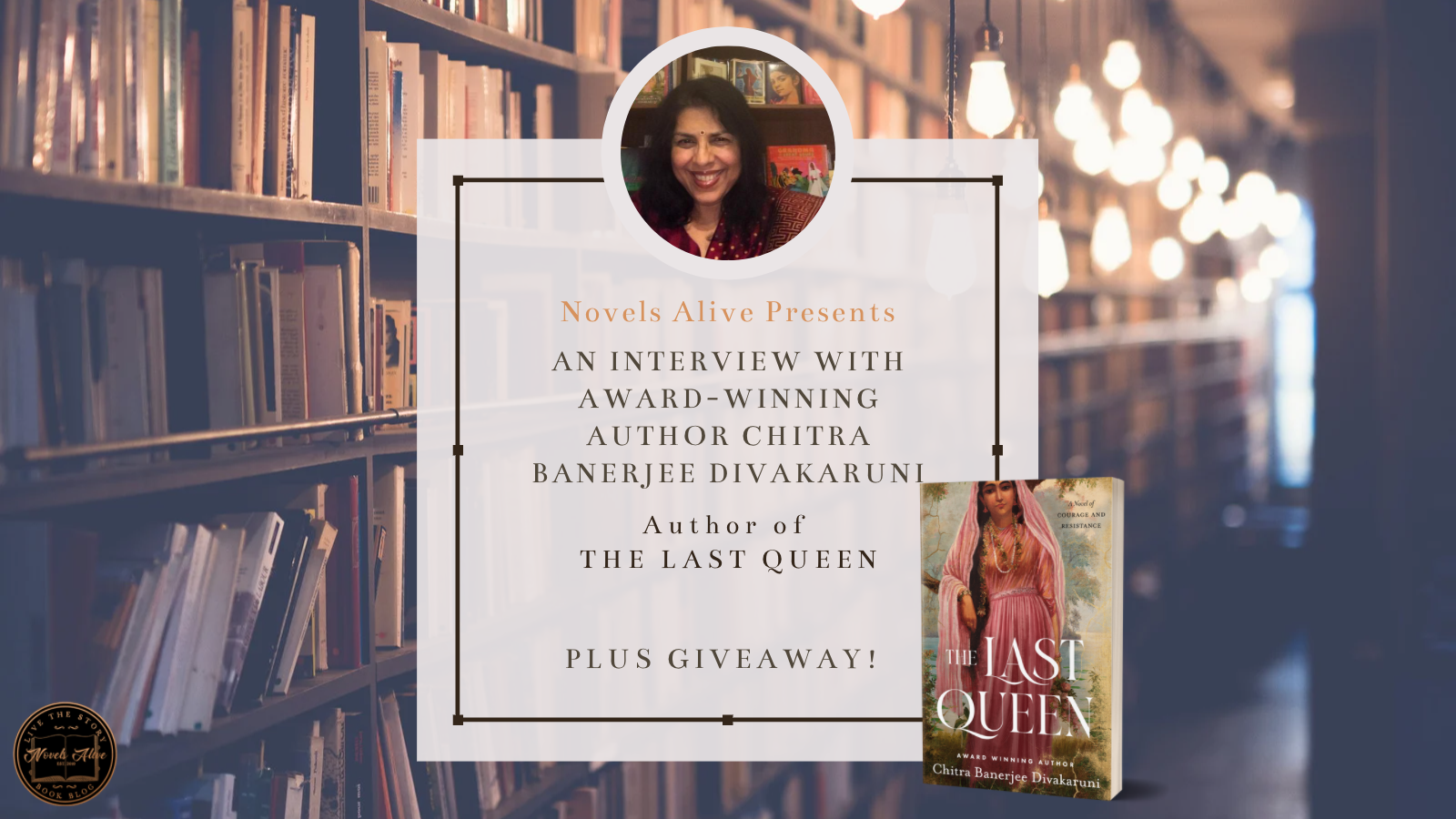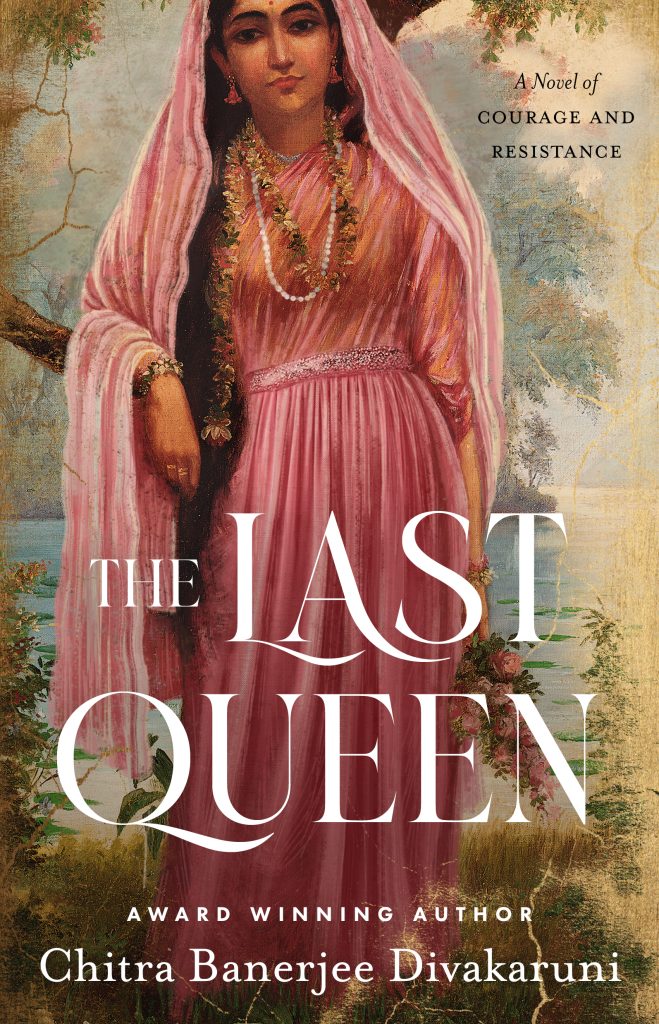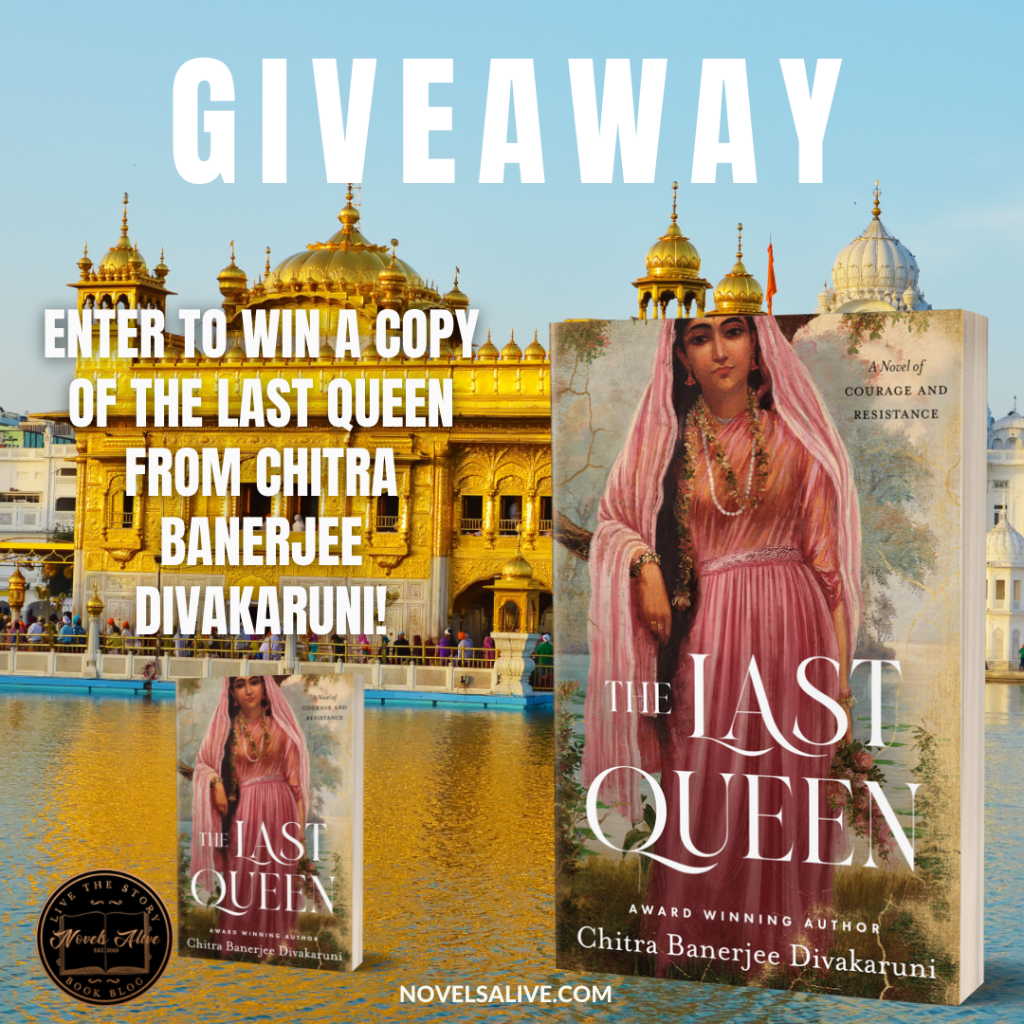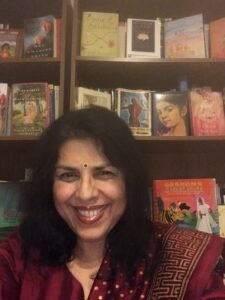 Today we welcome award-winning and amazingly talented author, Chitra Banerjee Divakaruni to answer our probing question about her upcoming novel, The Last Queen, releasing tomorrow!
Today we welcome award-winning and amazingly talented author, Chitra Banerjee Divakaruni to answer our probing question about her upcoming novel, The Last Queen, releasing tomorrow!
-
Delivering a book with such rich historical characters undoubtedly involved a great deal of research. What surprising tidbits did you discover in your research about Rani Jindan Kaur?
The first thing I discovered, to my surprise, was that this great and courageous queen who had been largely forgotten by history was not born into a royal or even an affluent family. She was the daughter of the trainer of the king’s hunting dogs! This made me realize that she was indeed an exceptional person, to make Maharajah Ranjit Singh, at that time the most powerful ruler in India, fall in love with her—to the extent that he offered to marry her, and promised her that he would not marry anyone else after that. He kept that promise and she became the great love of her life, his last queen.
-
As the last queen of Punjab, Jindan came from humble beginnings. How do you think that impacted her life?
The poverty in which Jindan grew up made her a very down-to-earth person. She never lost her taste for simple things like the country dishes she grew up with. She was also very altruistic. Even before she became queen, she donated significant amounts of money and jewelry to charitable causes. Perhaps because she had often been hungry in her childhood, she became known for feeding the poor.
-
Content to be the youngest wife of Maharaja Ranjit Singh, Jindan was ahead of her time in shedding her veil to make a point. Why would she break tradition?
Jindan broke the tradition of being veiled because she was in a difficult situation—indeed, a very dangerous one. Her young son Dalip Singh had just become heir to the kingdom after several of Ranjit Singh’s other children died under mysterious circumstances. Jindan knew she and her son were in grave danger. Several of the nobles wanted to use her son as a figurehead, restrict her to living in the women’s quarters, and rule the kingdom themselves. Or worse, they were ready to dispose of him (and her) and take over the kingdom. She needed strong allies to counter these dangers. She turned to the Khalsa Army, the soldiers that had fought beside Ranjit Singh and were very loyal to him. In order to make them trust her and feel as though she was “family,” she rode out to the cantonment, took off her veil, and addressed the soldiers openly and honestly, asking for their help. They were completely won over by this unexpected behavior and gave her the title “Mother of the Khalsa.” It was a brilliant move on Jindan’s part. She followed through by removing her veil in court, too, after that, and because of the support of the Khalsa army, the noblemen could not harm her.
-
On the surface, it might appear the book focuses on the evolution of an empire and the people who helped build it. Instead, there’s a strong theme about the importance of a mother-son bond. What prompted your interest in this subject?
The first thing I learned about Jindan was that the British, after taking over the kingdom of Punjab through treachery, had imprisoned her, separating her from her young son who was around nine years old. They took Dalip Singh away to England, converted him, and made an English couple his guardians. Mother and son would not see each other for many years. Their final reunion only took place because of a ploy of Dalip’s: he claimed that he wanted to go tiger-hunting in India, as many British noblemen of the time did.
I imagined the emotional mother-child reunion—she was almost blind then, and historical accounts state that she ran her hands over Dalip’s face, trying to recognize the boy he had been. When she realized that he had cut off his hair (a great taboo for Sikhs), she wept with grief at the loss of his heritage, for what had been done to him by the British. As a mother myself, I felt the moment deeply. That was when I decided that I had to write this book, this largely-untold story of their love and the sacrifices that both the mother and the son made for each other.
-
Dalip Singh seems to straddle two worlds with his heritage on one side and newly established British roots on the other. In retrospect, what could he have done to protect the empire his father built?
I don’t think he could have done much. The British got to him when he was at his most vulnerable. He was separated from his mother, who would have taught him how to be a king, when he was only a child. The British took him to England, removing him from his country, his countrymen, his Indian teachers, and even his loyal servants when he was barely a teenager. He was converted to Christianity; he was brainwashed into becoming “Queen Victoria’s Prince” and actually felt proud of that ironic title. Even after Jindan, finally reunited with her son, tells him about his proud heritage, his heroic father, and the immense wealth that the British snatched illegally from him (Punjab was supposed to be a protectorate, and additionally the British took away even Ranjit Singh’s personal property), he is torn in two. One part of him feels very British (the result of cultural colonization) while the other part is angry at what was done to him. It is only after Jindan’s death that he returns to his Sikh religion and his Indian identity. But by then it is too late. He has almost no money except what the British government gives him as a stipend. Additionally, the British ban him from returning to India, where he might have raised an army and fought against them. He tries hard to find allies in Russia but fails and dies penniless In Europe. Too many cards were stacked against this tragic figure.
-
Jindan maintains a close relationship with Mangla, which helps her navigate her new role. There is a scene in the book where Mangla assures Jindan that Dalip will be king. What makes her so confident?
Mangla is a believer in astrology. That is one reason for her belief. (There is a royal prophecy at Dalip’s birth—though it is a dark one. It says he will become king but then lose his kingdom). The second reason—and this is my personal interpretation—is that Mangla is very strong-willed. Throughout her life, she has a can-do attitude. There is a hint that she may have removed, through plotting and/or poison, the oldest queen of Ranjit Singh, a woman who has always hated Jindan. Out of loyalty to Jindan, Mangla decides that she will do everything possible to make sure Dalip (and thus Jindan as regent) inherit the throne. Additionally, she constantly encourages Jindan to believe in herself.
-
What are the takeaways you hope to convey with The Last Queen?
A major takeaway for me is this: while it may not be possible to control the forces of destiny, it is possible to respond to them with nobility and courage. That is what Jindan does through all the ups and downs of her life, and that is why, even when the British take away her kingdom, on some level they can never defeat her. She always maintains her dignity and her values—and her indomitable will. This aspect of her life was greatly inspiring for me, and I hope it will be so for readers of the book.
-
What’s next for you? What are you working on now?
Having written The Last Queen, I fell in love with historical fiction. I am now writing another historical novel, this one set around 1947, when the British will finally be forced out of India and the country will at last become independent. It focuses on a family of three sisters, young women who must learn, sometimes the hard way, what independence really means for individuals and for a nation, and the costs it exacts.
thank you so much, Chitra, for joining us today and giving us your brilliant insights into The Last Queen.

Publication Date: May 10, 2022
 WINNER of the 2022 INTERNATIONAL ASSOCIATION OF WORKING WOMEN AWARD for BEST FICTION OF THE YEAR!
WINNER of the 2022 INTERNATIONAL ASSOCIATION OF WORKING WOMEN AWARD for BEST FICTION OF THE YEAR!
LONGLISTED for 2022 DUBLIN LITERARY AWARD!
She rose from commoner to become the last reigning queen of India’s Sikh Empire. In this dazzling novel, based on true-life events, bestselling author Chitra Banerjee Divakaruni presents the unforgettable story of Jindan, who transformed herself from daughter of the royal kennel keeper to powerful monarch.
Sharp-eyed, stubborn, and passionate, Jindan was known for her beauty. When she caught the eye of Maharaja Ranjit Singh, she was elevated to royalty, becoming his youngest and last queen—and his favorite. And when her son, barely six years old, unexpectedly inherited the throne, Jindan assumed the regency. She transformed herself from pampered wife to warrior ruler, determined to protect her people and her son’s birthright from the encroaching British Empire.
Defying tradition, she stepped out of the zenana, cast aside the veil, and conducted state business in public, inspiring her subjects in two wars. Her power and influence were so formidable that the British, fearing an uprising, robbed the rebel queen of everything she had, but nothing crushed her indomitable will.
An exquisite love story of a king and a commoner, a cautionary tale about loyalty and betrayal, a powerful parable of the indestructible bond between mother and child, and an inspiration for our times, Chitra Banerjee Divakaruni’s novel brings alive one of the most fearless women of the nineteenth century, one whose story cries out to be told.

 [rafflepress id=”88″]
[rafflepress id=”88″]


 Chitra Banerjee Divakaruni is an award-winning author and poet. Her themes include the Indian experience, contemporary America, women, immigration, history, myth, and the joys and challenges of living in a multicultural world. Her work is widely known, as she has been published in over 50 magazines, including the Atlantic Monthly and The New Yorker, and her writing has been included in over 50 anthologies. Her works have been translated into 29 languages, including Dutch, Hebrew, Hindi and Japanese. Divakaruni also writes for children and young adults. Her novels One Amazing Thing, Oleander Girl, Sister of My Heart and Palace of Illusions are currently in the process of being made into movies. http://www.chitradivakaruni.com/books…. Her newest novel is Before We Visit the Goddess (about 3 generations of women– grandmother, mother and daughter– who each examine the question “what does it mean to be a successful woman.”) Simon & Schuster.
Chitra Banerjee Divakaruni is an award-winning author and poet. Her themes include the Indian experience, contemporary America, women, immigration, history, myth, and the joys and challenges of living in a multicultural world. Her work is widely known, as she has been published in over 50 magazines, including the Atlantic Monthly and The New Yorker, and her writing has been included in over 50 anthologies. Her works have been translated into 29 languages, including Dutch, Hebrew, Hindi and Japanese. Divakaruni also writes for children and young adults. Her novels One Amazing Thing, Oleander Girl, Sister of My Heart and Palace of Illusions are currently in the process of being made into movies. http://www.chitradivakaruni.com/books…. Her newest novel is Before We Visit the Goddess (about 3 generations of women– grandmother, mother and daughter– who each examine the question “what does it mean to be a successful woman.”) Simon & Schuster.
She was born in India and lived there until 1976, at which point she left Calcutta and came to the United States. She continued her education in the field of English by receiving a Master’s degree from Wright State University in Dayton, Ohio, and a Ph.D. from the University of California, Berkeley.
To earn money for her education, she held many odd jobs, including babysitting, selling merchandise in an Indian boutique, slicing bread in a bakery, and washing instruments in a science lab. At Berkeley, she lived in the International House and worked in the dining hall. She briefly lived in Illinois and Ohio, but has spent much of her life in Northern California, which she often writes about. She now lives in Texas, which has found its way into her upcoming book, Before We Visit the Goddess.
Chitra currently teaches in the nationally ranked Creative Writing program at the Univ. of Houston. She serves on the Advisory board of Maitri in the San Francisco Bay Area and Daya in Houston. Both these are organizations that help South Asian or South Asian American women who find themselves in abusive or domestic violence situations. She is also closely involved with Pratham, an organization that helps educate children (especially those living in urban slums) in India.
She has judged several prestigious awards, such as the National Book Award and the PEN Faulkner Award.
Two of her books, The Mistress of Spices and Sister of My Heart, have been made into movies by filmmakers Gurinder Chadha and Paul Berges (an English film) and Suhasini Mani Ratnam (a Tamil TV serial) respectively. Her novels One Amazing Thing and Palace of Illusions have currently been optioned for movies. Her book Arranged Marriage has been made into a play and performed in the U.S. and (upcoming, May) in Canada. River of Light, an opera about an Indian woman in a bi-cultural marriage, for which she wrote the libretto, has been performed in Texas and California.
She lives in Houston with her husband Murthy. She has two sons, Anand and Abhay (whose names she has used in her children’s novels).
Chitra loves to connect with readers on her Facebook author page, www.facebook.com/chitradivakaruni, and on Twitter, @cdivakaruni.
For more information about her books, please visit http://www.chitradivakaruni.com/, where you can also sign up for her newsletter.




















I’ve read almost all the works of Chitra Banerjee Divakaruni. I like her style, which attracts me like a rapture and a flow taking curiosity ahead. It also connects me with the emotions of characters very intimately. This is why, I’ve also written a couple of research papers and guided one PhD where 3 of her works are taken to compare with others. My younger daughter, Venu, is also her ardent fan qnd reads her. Hope I get to read this book The Last Queen too.